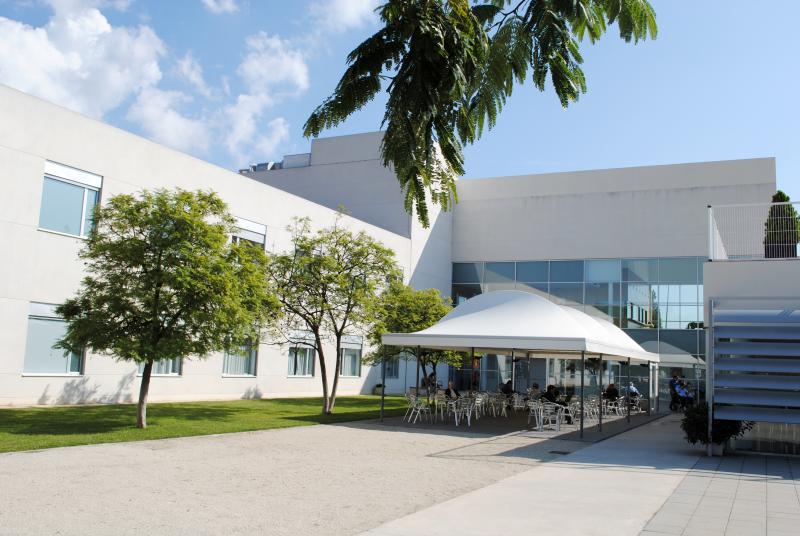World Environment Day: The Institut Guttmann reduces CO2 emissions in the atmosphere by 22.74%
World Environment Day: The Institut Guttmann reduces CO2 emissions in the atmosphere by 22.74%

Today, June 5, we celebrate World Environment Day with the slogan:
"Land restoration, resilience to drought and desertification"
- In the last 3 years, the Institut Guttmann has, with all its actions, reduced CO2 emissions into the atmosphere by 22.74%, an action equivalent to planting 723 trees.
- The environmental responsibility measures of the Badalona and Barcelona centers address sustainability from all areas: reduction of water resources, electricity consumption and CO2 emissions, sustainable architecture and waste segregation, among others.
The climate footprint of the health sector is equivalent to 4.4% of global emissions, equivalent to the annual emissions of 514 coal-fired power plants. A fact that is still paradoxical, considering that sustainability and health are intrinsically related. For this reason, environmental responsibility is one of the pillars of the Institut Guttmann's management, which applies a culture of sustainability with measures in numerous areas: reduction of water resources, electricity consumption and CO2 emissions, sustainable architecture and segregation of waste, among others. All of this means that, among other milestones, the organization has reduced its CO2 emissions by 22.7% in the last 3 years, along with an 8% reduction in water consumption.
"Recognizing that climate change affects the health of the population is an act of responsibility that the Guttmann Institute assumes as one of the priority objectives for the coming years, taking on the challenge with a proactive attitude", explains Montse Caldés, managing director and co-director of the Institut Guttmann.
The figures speak for themselves
From 954.56 tons of CO2 emitted in 2020, to 737.49 in 2022, the equivalent of planting 723 trees. This has been achieved through actions in all areas related to sustainability. Between 2021 and 2023, 608 photovoltaic panels have been installed, which means that 20% of the energy consumed in the hospital comes from self-consumption; the replacement of traditional lighting with LEDs has reduced the power of these lights by 71%, and the use of hybrid vehicles and chargers has made it possible to save 1.6 tons of CO2.
"The promotion of sustainable mobility is also a transversal factor that goes beyond energy saving - explains Caldés -. For example, the application of a Territorial Consolidation care program avoids unnecessary trips for patients and their families to the hospital and we bring treatment and rehabilitation, as far as possible, to centers close to their homes. In this way, we are having an impact on emissions but also on saving financial resources and time, and putting the well-being of patients and families at the center", she continues.
Regarding water resources, the measures implemented (taps with sensor, thermal covers to prevent evaporation...) have saved 6,000 m3 of water in 3 years, which is equivalent to the capacity of 2.5 Olympic swimming pools . Currently, 30 different types of waste are segregated using a compactor and specific containers, among other measures.
The environmental policy is part of the institutional culture and promotes the development of our activity, always taking into account the protection of the environment and trying to achieve maximum efficiency in the use of natural resources. In fact, it was a very present issue already in 1993, when the design of the Badalona hospital began to be considered and that continued with the inauguration of the new center in Barcelona, in 2019. Both buildings are designed with sustainability criteria, with a reduction in air conditioning consumption, the use of natural light with large windows, sustainable roofs with gravel for thermal insulation and the use of respectful materials that require minimal maintenance.
The Guttmann Institute has the certifications ISO 14001 for Environmental Management, ISO 50001 for Energy Management and the European EMAS Regulation, and in 2022 it received the distinction of the best project of Greenest Hospital in Europe 2022, awarded by the European Union of Hospitals Private and the Best National Sustainable Hospital Award 2011 from the Best in Class Awards. Likewise, the Guttmann Barcelona building, located in the La Sagrera neighborhood of Barcelona, also has BREEAM certification and energy rating A. For its part, the Badalona hospital uses ecological systems for cleaning and maintaining the undergrowth with sheep, reducing the use of machinery and avoiding emissions into the atmosphere. It also has therapeutic gardens with native vegetation and a programmable and sectorized drip irrigation system. This has made it possible to reduce irrigation water consumption by 14% in the last 5 years.
We take care of people, we protect the planet.
All these measures, says Caldés, "are part of an institutional culture that defends that sustainability is not just an environmental thing, but must permeate all actions from a management point of view". This implies promoting institutional sustainability in all its aspects: environmental, social, economic and cultural.
Thus, as a healthy institution, the Institut Guttmann articulates its commitment around three axes that integrate responsibility for the environment but also a commitment to the well-being of people and the humanization of management. This results, among other measures, in the promotion of healthy habits, emphasizing compliance with the regulations for a smoke-free environment, balanced nutrition and the benefit of a healthy natural environment, as well as in the comfort of the facilities and the creation of an inclusive, ethical and responsible work environment, where equality, effective communication and professional development are key.



